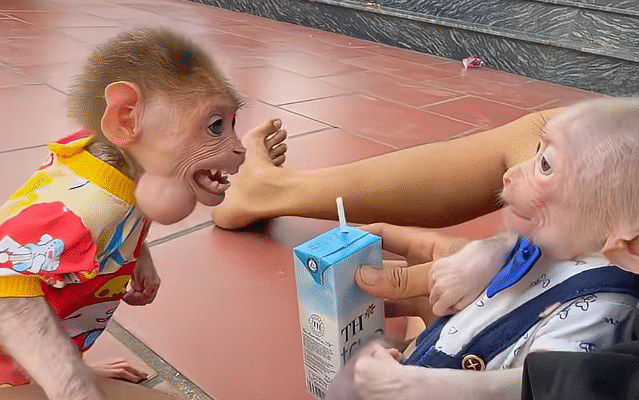The morning sun filtered softly through the trees, casting golden streaks of light on the little courtyard where Bibi and the baby monkey usually played. Bibi, the slightly older monkey, was always full of energy, mischievous in ways that often left everyone laughing. The baby, still clumsy and innocent, followed Bibi everywhere, copying every movement, learning how to climb, how to peel fruit, and how to play.
But on this particular morning, something unexpected happened.
The baby monkey had found a small toy—an old wooden rattle left behind by the children of the family. Excitedly, he shook it and giggled, his tiny hands clumsy but determined. Bibi, watching from the tree branch above, grew curious. He climbed down quickly, his eyes sparkling with mischief.

At first, Bibi only wanted to hold the toy. He reached out to grab it, but the baby pulled it back, giggling louder. The sound of that giggle, the refusal, and the baby’s stubbornness sparked something in Bibi’s mischievous heart. He tried again, this time tugging harder. The baby resisted, clinging to the rattle with all his strength.
Then, in a moment of impatience, Bibi raised his little hand and gave the baby a light smack.
The sound wasn’t loud, and the hit wasn’t cruel, but to the baby it was shocking. His big round eyes filled with tears. The giggles stopped. He let go of the toy and sat down on the ground, whimpering softly.
The rattle rolled away, but Bibi froze. He hadn’t expected the baby to react that way. For a few seconds, Bibi just stared, his tiny chest heaving. He looked from the baby to the toy and then back to the baby, as if suddenly realizing what he had done.
The humans watching nearby noticed immediately. “Oh, Bibi,” one of them sighed gently, walking over. “You can’t hit the baby.”

The baby was scooped up and comforted, cradled in warm hands, while Bibi hung back. His playful tail twitched nervously. Deep inside, he felt something he couldn’t quite explain—guilt. He hadn’t wanted to hurt his little companion. He just wanted the toy, just wanted to play his way. But seeing the baby’s tears made his stomach feel tight and heavy.
A little later, when things calmed down, the baby peeked out from the human’s arms. His big brown eyes, still wet with tears, glanced at Bibi. He wasn’t angry; he was simply hurt and confused. Why would his best friend hit him?
Bibi slowly crept forward. He crouched low, ears drooping, no longer proud or mischievous. He made a soft chattering sound, a monkey’s way of saying sorry. He reached out a hand, not for the toy this time, but for the baby’s tiny fingers.
At first, the baby hesitated. He sniffled, clinging to the human’s shirt. But when Bibi sat down beside him, quiet and gentle, the baby’s little heart softened. He reached out his hand, letting Bibi hold it.

The humans smiled. They could see the bond between the two was far stronger than one little mistake.
From then on, Bibi seemed to understand. When he played with the baby, he tried harder to be patient. If the baby held onto a toy, Bibi would wait or distract himself with something else. And when the baby offered him food, Bibi accepted it with gentleness, as if to make up for that one careless moment.
But monkeys, just like people, are full of lessons learned through trial and error. The next day, the two were playing again—this time chasing each other around a pile of leaves. The baby stumbled and fell, and Bibi, instead of laughing or teasing, reached down to help him up. That small act made the humans clap with delight.
The baby, who had already forgiven Bibi, squealed happily and hugged him.
And so, their days continued—sometimes noisy, sometimes chaotic, but always filled with love. The little incident of “Bibi hit baby” became part of their story, not as a moment of cruelty, but as a turning point where Bibi learned what it meant to care, to be gentle, and to protect.
Over time, Bibi grew into a more responsible older brother figure. He would peel bananas and share them, even when he wanted the whole fruit for himself. He would swing from the tree branch and then stop to make sure the baby could follow safely. If the baby cried, Bibi was often the first to rush over, patting his tiny back or bringing him a leaf to play with.
The humans often told visitors about that one day—“Remember when Bibi hit the baby?”—but they always ended the story with a smile. Because that day showed how even mischievous little monkeys could learn kindness.
One evening, as the sun set and the air cooled, the baby fell asleep in Bibi’s arms. The courtyard was quiet, only the sounds of crickets and rustling leaves filling the air. Bibi looked down at the baby’s peaceful face and blinked slowly. In that moment, it was clear—he wasn’t just a playmate anymore. He was a protector, a brother, a friend.
And though the story began with “Bibi hit baby,” it truly ended with “Bibi loved baby.”
Reflection
What makes this story touching is how it mirrors real life. Children—whether human or animal—sometimes make mistakes. They act out of impatience, curiosity, or jealousy. But mistakes are powerful teachers. Through them, they learn empathy, responsibility, and love.
Bibi didn’t stay the mischievous one who hit the baby. He became the gentle guardian who grew through that mistake.
The baby, too, learned something. Forgiveness came easily to him, and in forgiving, he strengthened their bond.
Together, they showed that even when small conflicts happen, love always finds a way to grow stronger.



